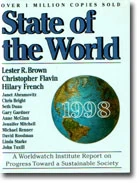In this fifteenth edition of State of the World, Lester R. Brown and the Worldwatch research team look at the environmental effects of continuing economic growth as the economy outgrows the earth's ecosystem. As the global economy has expanded from $5 trillion of output in 1950 to $29 trillion in 1997, its demands have crossed many of the earth's sustainable yield thresholds. State of the World 1998 describes the consequences of the collision between the expanding economy and the earth's natural limits: shrinking forests, falling water tables, eroding soils, collapsing fisheries, rising temperatures, and disappearing species. To reverse these trends, State of the World 1998 calls for a restructuring of the global economy, for converting a throw-away economy into a resuse/recycle economy, and for shifting from fossil fuels to solar/hydrogen energy. To do this it recommends a shift in taxes: a reduction in income taxes and an increase in taxes on carbon dioxide emissions, the generation of toxic waste, the use of pesticides, and the use of virgin raw materials. Written in clear and concise language, with easy-to-read charts and tables, State of the World presents a view of our changing world that we cannot afford to ignore.
- Chapter 1: The Future of Growth
- Chapter 2: Sustaining the World's Forests
- Chapter 3: Losing Strands in the Web of Life
- Chapter 4: Promoting Sustainable Fisheries
- Chapter 5: Struggling to Raise Cropland Productivity
- Chapter 6: Recycling Organic Wastes
- Chapter 7: Responding to the Threat of Climate Change
- Chapter 8: Curbing the Proliferation of Small Arms
- Chapter 9: Assessing Private Capital Flows to Developing Countries
- Chapter 10: Building a New Economy
Preceded by State of the World 1997.
Followed by State of the World 1999
Readers review[]
You can post your review here!

